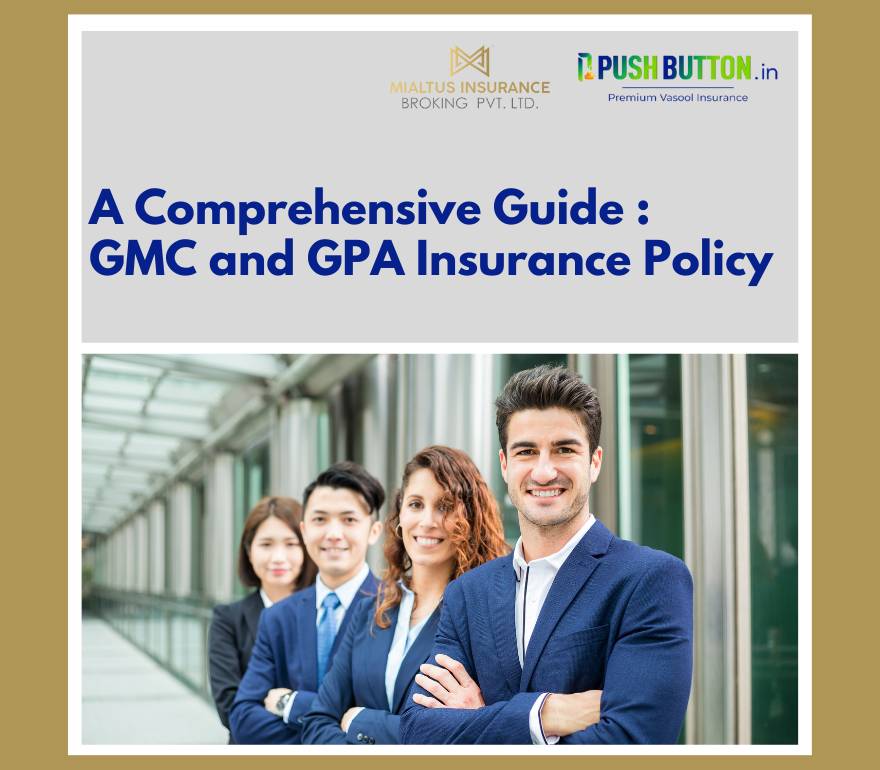In today’s fast-paced world, where uncertainties abound, having the right insurance coverage is crucial for safeguarding our well-being and that of our loved ones. Two essential insurance policies that offer comprehensive protection for groups are GMC (Group Medical Cover) and GPA (Group Personal Accident) Insurance Policies. In this guide, we’ll delve into the basics of these policies, exploring their features, benefits, and how they can provide peace of mind for both employers and employees.

What is GMC Insurance?
GMC Insurance, also known as Group Medical Cover, is a type of health insurance policy designed to provide coverage to a group of individuals, typically employees of a company or members of an organization. The primary objective of GMC insurance is to ensure that employees have access to quality healthcare services without having to bear the entire financial burden themselves.
Key Features of GMC Insurance:
Comprehensive Health Coverage: GMC insurance offers coverage for a wide range of medical expenses, including hospitalization, surgeries, treatments, diagnostic tests, medications, and more. This ensures that employees can receive timely medical care without worrying about the cost.
Cashless Treatment: One of the significant advantages of GMC insurance is the provision for cashless treatment at network hospitals. This means that employees can avail of medical services without having to pay upfront, as the insurance company settles the bills directly with the hospital.
Coverage for Dependents: In many cases, GMC insurance policies extend coverage not only to employees but also to their dependents, including spouses, children, and sometimes parents. This comprehensive coverage ensures that the entire family is protected against medical emergencies.
Customizable Plans: GMC insurance plans can be customized to suit the specific needs and requirements of the insured group. Employers can choose from various coverage options, including different sum insured levels, co-payment options, and add-on benefits, based on their budget and preferences.
What is GPA Insurance?
GPA Insurance, or Group Personal Accident Insurance, is a type of insurance policy that provides financial protection to members of a group in the event of accidental injuries, disabilities, or death. Unlike health insurance, which covers medical expenses, GPA insurance offers compensation for the loss of income and other financial hardships resulting from accidents.
Key Features of GPA Insurance:
Accidental Death Benefit: GPA insurance provides a lump-sum payout to the nominee or beneficiary in the event of the insured individual’s death due to an accident. This financial assistance helps alleviate the financial burden on the family during a difficult time.
Permanent Total Disability Coverage: In case of permanent total disability caused by an accident, GPA insurance offers compensation to the insured individual. This amount can be used to cover medical expenses, rehabilitation costs, and other expenses associated with long-term disability.
Weekly Compensation for Temporary Disability: If the insured individual suffers temporary disability due to an accident and is unable to work, GPA insurance provides weekly compensation for the duration of the disability. This helps the individual maintain financial stability during the recovery period.
24/7 Worldwide Coverage: GPA insurance offers round-the-clock coverage, both on and off the job, ensuring that members of the insured group are protected against accidents wherever they may occur.
Here’s a simplified explanation of GMC and GPA Insurance Policies, classified according to IRDAI (Insurance Regulatory and Development Authority of India), presented in a two-column format:
GMC (Group Medical Cover) |
GPA (Group Personal Accident) |
| Provides health insurance coverage for employees of a group or organization. | Offers financial protection in case of accidental injuries or death to members of a group. |
| Covers medical expenses incurred due to hospitalization, surgeries, treatments, and more. | Provides compensation for accidental disabilities, loss of income due to accidents, and death benefits to beneficiaries. |
| Policy premiums are typically paid by the employer, with coverage extending to employees and sometimes their dependents. | Policy premiums are usually borne by the employer and provide coverage to employees against accidental injuries occurring both on and off the job. |
| Benefits include cashless hospitalization, reimbursement of medical expenses, and access to a network of hospitals. | Benefits may include lump-sum payouts for permanent disabilities, weekly compensation for temporary disabilities, and additional coverage for accidental death. |
| GMC policies are regulated by IRDAI guidelines and can be customized based on the needs and size of the group. |
GPA policies adhere to IRDAI regulations and can be tailored to suit the specific requirements of the insured group, ensuring comprehensive coverage at affordable premiums. |
Understanding the Difference: GMC vs. GPA Insurance
While both GMC and GPA insurance policies provide valuable protection for groups, it’s essential to understand the differences between the two:
Coverage Focus: GMC insurance primarily focuses on providing health coverage for medical expenses incurred due to illnesses or injuries, while GPA insurance focuses on providing financial protection in the event of accidental injuries, disabilities, or death.
Benefit Structure: GMC insurance offers coverage for medical treatments, hospitalization, and related expenses, while GPA insurance offers financial benefits such as accidental death benefits, permanent total disability coverage, and weekly compensation for temporary disability.
Nature of Claims: Claims under GMC insurance are related to medical treatments and expenses, whereas claims under GPA insurance are related to accidental injuries, disabilities, or death.


